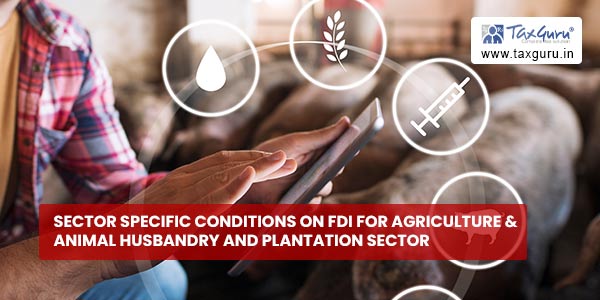FDI is permitted in Different Sectors like Agriculture, Mining and Petroleum & Natural Gas Manufacturing, Services Sector Financial Services, and Other sectors such as Pharmaceuticals, etc., we will discuss sector-specific conditions specified in Agricultural Sector here.
Before going into detailed Discussion, let’s discuss in short the Prohibited Sectors under FDI, where FDI is not permitted under any entry route in India
PROHIBITED SECTORS
FDI is prohibited in:
1. Lottery Business including Government/private lottery, online lotteries, etc.
2. Gambling and Betting including casinos etc.
3. Chit funds
4. Nidhi company
5. Trading in Transferable Development Rights (TDRs)
6. Real Estate Business or Construction of Farm Houses
Real estate business’ shall not include development of townships, construction of residential /commercial premises, roads or bridges, and Real Estate Investment Trusts (REITs) registered and regulated under the SEBI (REITs) Regulations 2014.
7. Manufacturing of cigars, cheroots, cigarillos, and cigarettes, of tobacco or of tobacco substitutes
8. Activities/sectors not open to private sector investment e.g.(I) Atomic Energy and (II) Railway operations (other than permitted activities mentioned in para 5.2).
Foreign technology collaboration in any form including licensing for franchise, trademark, brand name, management contract is also prohibited for Lottery Business, Gambling, and Betting activities.

COMMON CONDITIONS FOR PERMITTED SECTORS
9. In the permitted sectors/activities, FDI up to the limit indicated against each sector/activity is allowed, subject to applicable laws/regulations; security and other conditionalities. In sectors/activities not listed below, FDI is permitted up to100% on the automatic route, subject to applicable laws/regulations; security and other conditionalities. Wherever there is a requirement of minimum capitalization, it shall include share premium received along with the face value of the share, only when it is received by the company upon issue of the shares to the non-resident investor. Amount paid by the transferee during post-issue transfer of shares beyond the issue price of the share, cannot be taken into account while calculating minimum capitalization requirement.
10. Sectoral cap i.e. the maximum amount which can be invested by foreign investors in an entity, unless provided otherwise, is composite and includes all types of foreign investments, direct and indirect, regardless of whether the said investments have been made under Schedules I (FDI), II (FPI), III (NRI), VI (LLPs), VII (FVCI), VIII(Investment Vehicles), and IX (DRs), respectively, of Foreign Exchange Management (Non-Debt Instruments) Rules, 2019. FCCBs and DRs having underlying of instruments which can be issued under Schedule IX, being in the nature of debt, shall not be treated as foreign investment. However, any equity holding by a person resident outside India resulting from conversion of any debt instrument under any arrangement shall be reckoned as foreign investment under the composite cap.
11. Foreign investment in sectors under Government approval route resulting in transfer of ownership and/or control of Indian entities from resident Indian citizens to non-resident entities will be subject to Government approval. Foreign investment in sectors under automatic route but with conditionalities, resulting in transfer of ownership and/or control of Indian entities from resident Indian citizens to non-resident entities, will be subject to compliance of such conditionalities.
12. The sectors which are already under 100% automatic route and are without conditionalities would not be affected.
13. Notwithstanding anything contained in paragraphs a) and c) above, portfolio investment, up to aggregate foreign investment level as permitted under Schedule II of Foreign Exchange Management (Non-Debt Instruments) Rules, 2019 will not be subject to either Government approval or compliance of sectoral conditions, as the case may be, if such investment does not result in transfer of ownership and/or control of Indian entities from resident Indian citizens to non-resident entities. Other foreign investments will be subject to conditions of Government approval and compliance of sectoral conditions as laid down in the FDI policy.
14. Total foreign investment, direct and indirect, in an entity will not exceed the sectoral/statutory cap.
15. Any existing foreign investment already made in accordance with the policy in existence would not require any modification to conform to amendments introduced through Press Note 8 (2015 Series).
16. Wherever the foreign investor wishes to specify a particular auditor/audit firm having an international network for the Indian investee company, then an audit of such investee companies should be carried out as a joint audit wherein one of the auditors should not be part of the same network.
17. The onus of compliance with the above provisions will be on the investee company.
SECTOR-SPECIFIC CONDITIONS ON FDI FOR AGRICULTURE
AGRICULTURE & ANIMAL HUSBANDRY
| Sector/Activity
|
% of Equity/ FDI Cap | Entry Route |
| a) Floriculture, Horticulture, and Cultivation of Vegetables & Mushrooms under controlled conditions;
b) Development and Production of seeds and planting material; c) Animal Husbandry (including breeding of dogs), Pisciculture, Aquaculture, Apiculture; and d) Services related to agro and allied sectors |
100% | Automatic |
| Note: Besides the above, FDI is not allowed in any other agricultural sector/activity | ||
OTHER CONDITIONS
1. The term “under controlled conditions” covers the following:
2. Cultivation under controlled conditions for the categories of floriculture, horticulture, cultivation of vegetables and mushrooms is the practice of cultivation wherein rainfall, temperature, solar radiation, air humidity, and culture medium are controlled artificially. Control in these parameters may be effected through protected cultivation under green houses, net houses, poly houses, or any other improved infrastructure facilities where micro-climatic conditions are regulated anthropogenically.
PLANTATION SECTOR
| Sector/Activity
|
% of Equity/ FDI Cap | Entry Route |
| (i) Tea sector including tea plantations
(ii) Coffee plantations (iii) Rubber plantations (iv) Cardamom plantations (v) Palm oil tree plantations (vi) Olive oil tree plantations |
100% | Automatic |
| Note: Besides the above, FDI is not allowed in any other plantation sector/activity. | ||
OTHER CONDITION
Prior approval of the State Government concerned is required in case of any future land use change.





